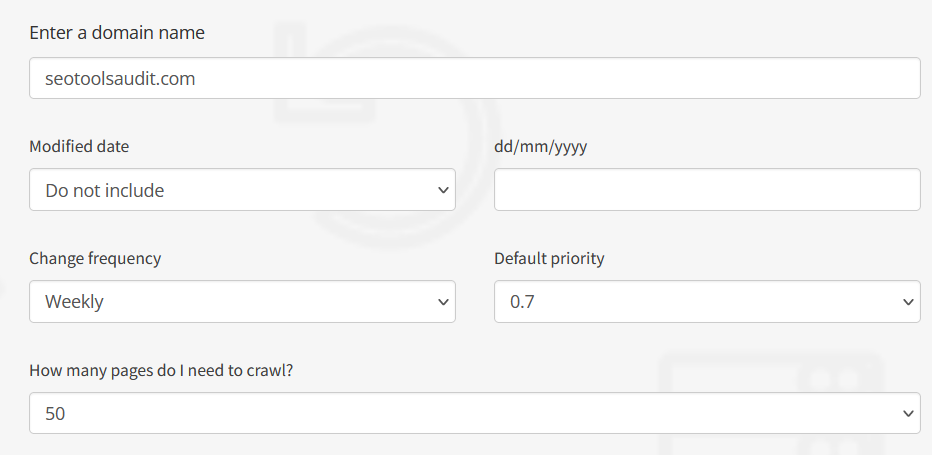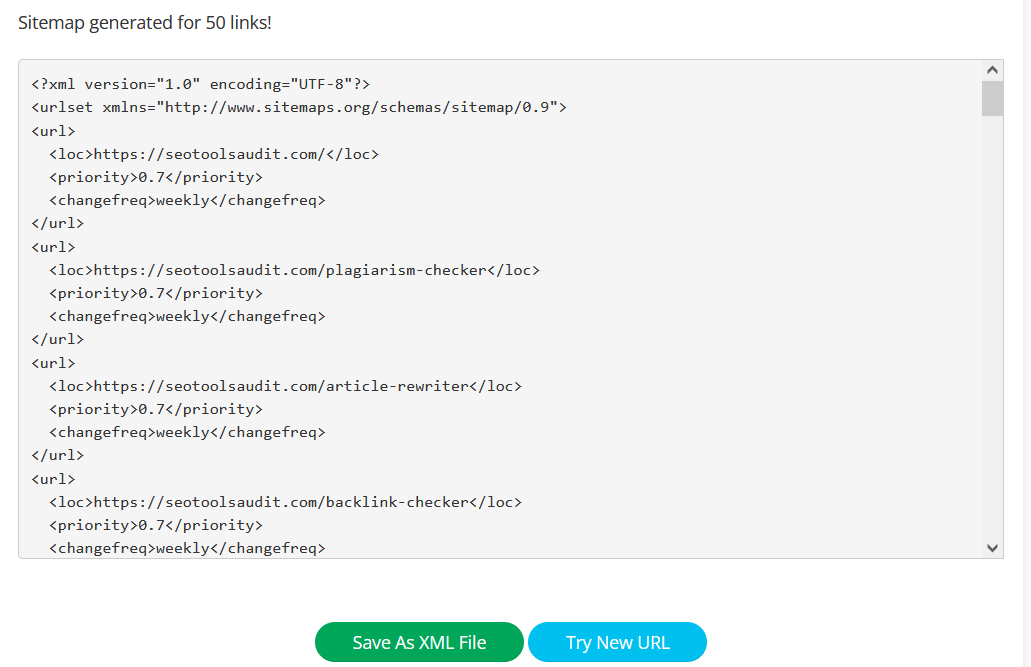XML Sitemap Generator
Use our Sitemap Generator tool to notify search engines including Google, Bing, and Yandex, about all your web pages and any changes in them, and make sure all your pages are correctly indexed.
About XML Sitemap Generator
Every website is divided into sections and content pages created to suit the users' needs. However, every user has different needs, requiring them to direct each user to their exact needs without navigating the whole website. For the search engine to rank the page or content, it must go through these sites regularly to see new content and identify the old ones.
A clear map makes it easier for the search engine to go through each page. This map is called the sitemap.
What is an XML Sitemap Generator?
A sitemap is a list of your page's URLs containing a list of your website content in a machine-readable form to make it easy to discover the content and direct users to the content page.
The sitemap generator automatically creates the sitemap for you, saving you time and ensuring accuracy.
XML sitemap generator is the tool you need to make a complete, accurate map of your website. You can use it to ensure that all your pages are indexed by search engines, improving SEO performance.
Benefits and Features of XML Sitemap Generator
1. Find and Index Page
Using an XML sitemap generator makes it easier for Google and other search engine crawlers to crawl properly and index every page of your website. This increases your search engine presence.
A thorough sitemap is also helpful when asking search engines like Google to make revisions or upgrades.
2. Improved Visibility
It is also simpler for webmasters to update their sitemaps when modifications are made, or new Links are added when they have an XML sitemap prepared with a suitable interface.
Utilizing an XML Sitemap Generator ensures that your website has better exposure in SERPs and increased organic traffic.
3. Identifies Sitemap Issues
If you use an effective XML sitemap generator, you'll be alerted to any sitemap issues, so you can fix them immediately. You will also have an advantage in requesting updates and changes from different search engines.
4. Gives Essential Information
The XML sitemap generator also provides essential information to the search engine after giving structure to the website pages and content. It provides info on - How often content is uploaded or changed on a website, How content on a page relates to other pages on the site, New updates on the page and the time of update, the Importance of pages to the site,
Elements a Sitemap Should Include
To guarantee maximum SEO performance, there are a few components you need to include in your sitemap.
- URLs: A list of all the Links on your website should be the initial part of your sitemap. Search engines can better rank material in search results by knowing what to crawl and index.
- Metadata: As search engines need more effort to understand photos, including information in your sitemap is crucial for image searches. Ensure that each image has the proper title, caption, description, and copyright information so that Google can understand what each image is about.
- Page Priority: To quickly improve your SERP ranks, indicate which sites are the most crucial for SEO success. These pages should be crawled first and given priority over others based on how relevant they are to user searches.
How to use XML Sitemap Generator?
Here are tips on how to correctly use an XML sitemap generator to include your pages in your XML sitemaps, and compile a list of all the URLs on your website, including any that are buried deep within the website.
Given that XML sitemaps serve as a navigational guide for search engine spiders, ensure all content is current and accurate. Sort the pages in your index by importance or relevance for SEO.
- Enter the website URL in the XML Sitemap generator
- Customize the options given; change frequency, default priority, pages to crawl, and date.

- Complete the robots verification process and click on "Generate Sitemap" button.
- After the process, it will give you all the information you need. Save it and download it in .xml format.

Go to your website’s root directory and put the file in the domain root folder. Set up automated alerts to stay informed of updates to your website, allowing you to edit or add material to your sitemaps as necessary.
Search engine responses should be tracked, analyzed, and any necessary improvements should be made. Ensure your pages and content are visible in these important search engines using Google's Search Console and Bing's Webmaster Tools.
FAQs
How Does a Sitemap Generator Work?
After creating the sitemap, the sitemap generators automatically alert the search engines. They work with various websites, including forums, blogs, e-commerce sites, portals, etc. The feature to auto-refresh makes it possible to update your sitemap whenever you wish.
How Does XML Sitemap Affect SEO?
XML sitemaps affect indexing but not ranking. XML sitemaps are neither required for indexing nor guaranteeing it will happen. Therefore, you should consider using a sitemap generator.
Also, Google advises using it for large sites with often changing Addresses as it makes it easier for Google and other search engines in finding pages and content on a website.
What is the difference between XML sitemap and sitemap?
The primary distinction between the two forms is that although XML sitemaps are made for search engines, HTML sitemaps are simple for users to read and comprehend. XML sitemap is created for search engine robots to read.
This document contains much of the work a webpage does in the background. Conclusion Success in SEO depends on creating a detailed and smart sitemap. The ideal tool to assist you in tracking and optimizing the content of your website for search engine crawlers is an XML sitemap generator.
A solid website architecture must include sitemaps, and XML sitemap generators offer a terrific method to begin this process. You can produce sitemaps with the correct XML sitemap generator, which will help you increase website traffic and visibility.
Research Websites
- http://seotoolsaudit.com/xml-sitemap-generator
- https://www.linkedin.com/advice/0/what-benefits-using-sitemap-generator-tool-seo
- https://www.searchenginejournal.com/technical-seo/xml-sitemaps/
- https://developers.google.com/search/docs/crawling-indexing/sitemaps/overview
LATEST BLOGS
Search
-
Popular Seo Tools
- Plagiarism Checker
- Paraphrasing Tool
- Keyword Position Checker
- Grammar Checker
- Domain Authority Checker
- PageSpeed Insights Checker
- Image Compression Tool
- Reverse Image Search
- Page Authority checker
- Text To Speech
- Backlink Checker
- Backlink Maker
- Domain Age Checker
- Website Ping Tool
- Website Reviewer
- Keyword Density Checker
- Page Size Checker
- Word Counter
- Mozrank Checker

